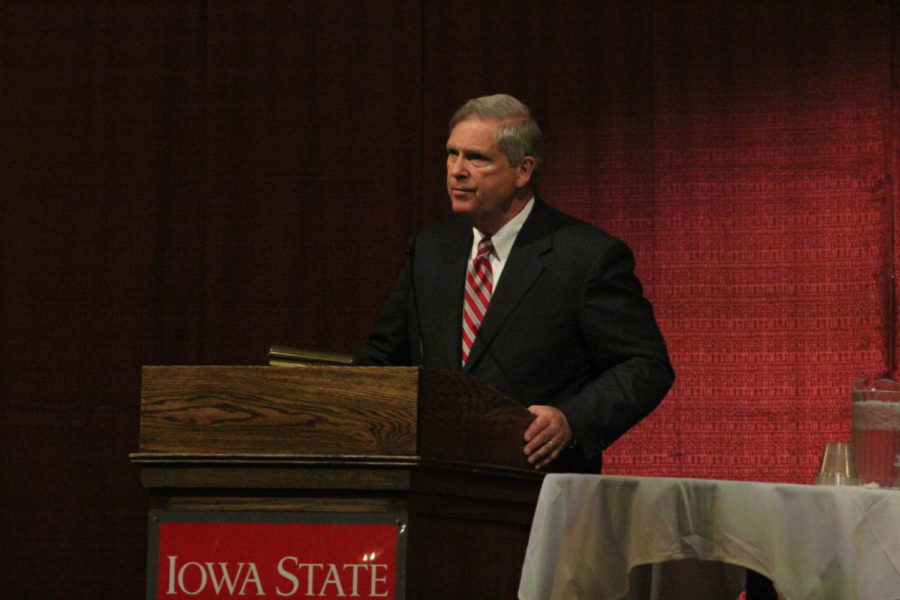Vilsack delivers lecture on agriculture and climate change
Tom Vilsack, former Iowa Governor and Secretary of Agriculture, speaking to Iowa State students about the needs and future of Americas agriculture industry at the Memorial Union on Nov. 16, 2017.
November 16, 2017
Former governor of Iowa and head of the USDA Tom Vilsack discussed the ramifications of climate change on agricultural production to a fully-seated audience in the Great Hall of the Memorial Union.
The topic of sustainability was incorporated into the lecture as Vilsack highlighted the cyclical nature of agricultural production, particularly from an economic standpoint.
“Increased protein production [and] global trade opportunities depend on production, and of course, production depends on having the capacity, from a weather standpoint, to produce all of that additional food,” Vilsack said.
Referencing a number of statistical findings and anecdotal recollections, Vilsack stressed the importance of practicing conservation as weather patterns continue to evolve, such as ensuring soil health by utilizing more expansive crop rotation systems, and practicing nitrogen stewardship by working to improve water quality.
The president and CEO of the U.S. Dairy Export Council said it would only take three catastrophic weather events to disrupt world food production by 5 percent to 10 percent.
While placing an emphasis on the projected effects from climate change, Vilsack said that the changing environment is more imminent than hypothetical, referencing recent natural disasters within the U.S, from Hurricane Harvey to the wildfires in California.
In addition to presenting the central topic in a nationwide and international context, Vilsack localized the issue of climate change, alluding to Iowa’s historical role in addressing changing weather patterns.
During his tenure as the U.S. Secretary of Agriculture, Vilsack oversaw the establishment of “climate hubs” across the nation, where scientists would conduct a thorough review of hypothetical outcomes from climate change, and determine how to adapt to those changes.
From this emerged a survey assessing farmers’ perceptions of climate change. Results indicated that when using the phrase “climate change” in the questionnaire, 80 percent of farmers were not interested in obtaining information about the topic. However, when using the words “weather variability,” the result was paradoxical: 80 percent of farmers wanted information.
“If we are going to have a conversation with folks, we need to make sure that we use the right language so that we do not have a stop to the conversation before we get to the heart of it,” Vilsack said.
In addition to discussing climate as it relates to weather and the environment, Vilsack also touched on the political climate within the United States, and the challenges associated with ideological division.
Compared to other areas in politics, Vilsack said that both climate change and agriculture are topics that should not be seen as partisan.
“If we approach [discussions] from ‘you might learn something’ as opposed to ‘you are wrong, and I am going to prove you wrong,’ you might have a more fruitful conversation,” Vilsack said.
Vilsack pointed to the role of food in serving as a uniting factor for Americans of all ideological viewpoints.
“Food is a great convener,” Vilsack said. “What if young people in this country convened hundreds of opportunities for people right and left, red and blue, republican and democrat, to sit down? To talk?”
Kelsey Tyrrell, a lecture attendee, said that Vilsack’s delivery and presentation was encouraging to listen to.
“It was refreshing to hear such a unifying message in his remarks, and what we can come together on, and why it is important to come together on those issues,” Tyrrell said.
Vilsack also linked the topic of climate change to food waste, as nearly one third of food throughout the world is never consumed following production.
The U.S. dairy industry leader suggested that the industry partner with underprivileged families to provide them with surplus milk supply, as opposed to dumping the excess.
“I like that he touched on reducing waste as a way to feed people, because I don’t think that a lot of people think about that.” said Savanah Laur, an Iowa State student attendee.
The lecture was sponsored by the Citizens Climate Lobby, Environmental Law & Policy Center, National Affairs, and the Committee on Lectures funded by Student Government.







